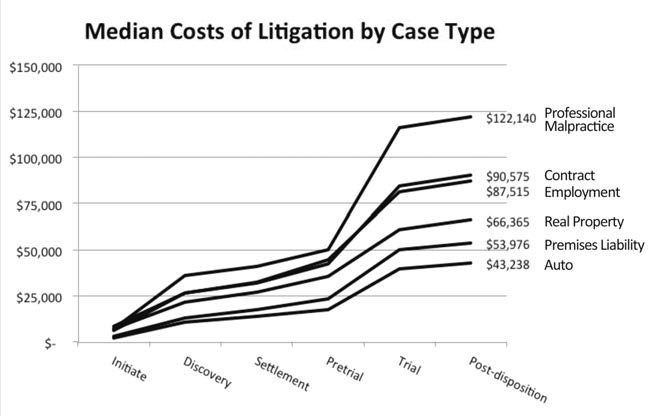4 Alternative Dispute Resolution
4 Alternative Means of Resolving Disputes
Learning Objectives
After reading this section, you should be able to do the following:
- Identify the different methods of alternative dispute resolution.
- Decide when ADR is more appropriate than litigation to resolve a dispute.
Although this book primarily focuses on trials and litigation, Alternative Dispute Resolution (“ADR”) methods offer parties a way to settle their disputes outside the courtroom. The umbrella term ADR includes any method of resolving disputes without litigation. ADR includes a range of conflict resolution processes and techniques that occur outside of any governmental authority. This chapter will focus on three common ADR methods: negotiation, mediation, and arbitration.
4.1 Pitfalls of Litigation
Litigation has many drawbacks and should be treated by businesses as a last resort. First, litigation can be incredibly expensive for all parties involved. For example, during the Deepwater Oil Spill in 2010, over 130 million gallons of oil leaked into the Gulf of Mexico.[1] The spill caused immense harm to the environment and to individuals living nearby. BP Oil was held responsible for the spill and ultimately agreed to pay over $11 billion to injured parties. The settlement included a payment of almost $600 million in attorneys’ fees to the lawyers representing the injured parties. This does not include the amount that BP Oil spent on its own attorneys, which is unknown. If the parties had resolved their disputes outside of court – which is admittedly unlikely in this case – hundreds of millions of additional dollars could have gone to environmental clean-up and injured parties instead of to attorneys.
Even in smaller-scale cases, attorneys’ fees regularly cost tens or hundreds of thousands of dollars. The chart below shows the median litigation costs for various types of claims.[2] Based on the chart below, if an employee sues for $50,000 in lost wages, would it make more financial sense to pay the employee or to go to court? Are there any other important considerations besides the cost of attorneys?

In addition to the high costs of litigation, cases can go on for years and demand large amounts of a business’s time. In 2011, for example, Apple accused Samsung of copying the iPhone. Seven years and a trip to the Supreme Court later, the parties finally settled the case in 2018.[3] Although major companies can afford to be tied up in litigation for years, most businesses would prefer to spend their time and money on other matters.
 Finally, the adversarial nature of litigation can permanently damage relationships between the parties. This may not have mattered for two competitors like Apple and Samsung. However, what if a distributor of bicycles had a dispute with their largest supplier of bicycle tires? Even a well-intentioned lawsuit may anger the supplier and ruin the relationship between the two companies. This would leave the bicycle distributor with a short-term win in the lawsuit but a long-term problem of where to find tires. It is therefore crucial to consider the risks to a business relationship before filing a lawsuit against another party who you may work with again in the future.
Finally, the adversarial nature of litigation can permanently damage relationships between the parties. This may not have mattered for two competitors like Apple and Samsung. However, what if a distributor of bicycles had a dispute with their largest supplier of bicycle tires? Even a well-intentioned lawsuit may anger the supplier and ruin the relationship between the two companies. This would leave the bicycle distributor with a short-term win in the lawsuit but a long-term problem of where to find tires. It is therefore crucial to consider the risks to a business relationship before filing a lawsuit against another party who you may work with again in the future.
ADR methods address these issues by reducing the cost, time, and animosity in a dispute.
4.2 Negotiation
Negotiation is the preeminent mode of dispute resolution. While the two most commonly discussed forms of ADR are arbitration and mediation, negotiation is almost always attempted first to resolve a dispute. Negotiation allows the parties to meet in order to settle a disagreement. The main advantage of this form of dispute settlement is that it allows the parties themselves to control the process and the solution. Negotiation is much less formal than other types of ADRs and allows for a lot of flexibility.
Most businesses and individuals will naturally rely on negotiation as a first step in a dispute. If a warehouse fails to deliver a shipment of products on time to a store, that store’s manager will likely try to solve the problem through negotiation as a first step. This could be as simple as calling the warehouse and asking why the delay occurred and whether it will happen again. Perhaps the manager would seek a discount on the late products or a guarantee that there would be no more delays. This approach would save the time, money, and animosity associated with litigation. It would also be faster and less expensive than other forms of ADR like mediation and arbitration.
What if the relationship between the store and warehouse was already strained? Maybe it had delivered a number of items late over the past year and had not kept its promises in past negotiations. Negotiations are a great first step for resolving problems, but they rely on the ability of the two parties to reach an agreement without outside help. When this is not possible, the parties may want to rely on mediation or arbitration to resolve their disputes.
4.3 Mediation
 Mediation is a slightly more formal type of ADR in which the parties rely on a neutral third person to help solve their dispute. This neutral third person – called a mediator – is selected by the parties. She serves as something like a referee in the disagreement. Like athletes, the parties have full control over how they “play the game” and its outcome. They can freely engage in discussion (within the scope of the agreed upon rules) and accept or reject any proposed resolutions. As the referee, the mediator’s role is only to enforce the agreed upon rules. These may include the length of meetings and the general items to be addressed during them. However, the mediator has no authority to bind the parties to an agreement, even when she thinks it is in their best interests.
Mediation is a slightly more formal type of ADR in which the parties rely on a neutral third person to help solve their dispute. This neutral third person – called a mediator – is selected by the parties. She serves as something like a referee in the disagreement. Like athletes, the parties have full control over how they “play the game” and its outcome. They can freely engage in discussion (within the scope of the agreed upon rules) and accept or reject any proposed resolutions. As the referee, the mediator’s role is only to enforce the agreed upon rules. These may include the length of meetings and the general items to be addressed during them. However, the mediator has no authority to bind the parties to an agreement, even when she thinks it is in their best interests.
Mediation can be effective when parties are unable to resolve their disputes through direct negotiation. During a contentious divorce, for example, spouses may rely on a mediator to help divide their assets before going straight to trial. They may negotiate in the presence of a mediator (“conference mediation”) or could even sit in separate rooms and speak to each other only through the mediator (“shuttle mediation”). Reaching an agreement before going to trial could save the spouses thousands of dollars as well as the headache of going to court.
Mediation can be advantageous in a business setting due to its speed and affordability. For example, a jeweler sued a supplier for failing to deliver approximately $57,000 worth of jewelry. Before trial started, both parties agreed to use a mediator to try to settle the disagreement. They reached an agreement in which the supplier would pay back $39,000 and would continue to sell the jeweler items at a discounted rate. The mediation took four hours and cost each party $560.[4] If Apple and Samsung had resolved their dispute in this way, they could have saved seven years and tens of millions of dollars in legal fees.
The jeweler example demonstrates a third advantage of mediation over litigation: more room for creativity. Judges and juries are constrained in the types of remedies they may award at the end of a trial. In contrast, parties in a mediation can reach agreements tailored to their unique needs. The result may include monetary awards or other creative solutions like an ongoing discount on a product. Thus, creative mediation agreements can both repair a harm and serve other needs like encouraging a continued business relationship.
4.4 Arbitration
Arbitration is a type of ADR in which the parties rely on a private decision maker (an “arbitrator”) to resolve their disputes. Although the rules of procedure are considerably more relaxed than those that apply in the courtroom, the proceedings are closer to a trial than other forms of ADR.
Arbitrators might be retired judges, lawyers, or anyone with the kind of specialized knowledge and training that would be useful in making a final, binding decision on the dispute. In a contractual relationship, the parties can decide even before a dispute arises to use arbitration when the time comes. They will typically express this preference by including an arbitration clause in the contract. In an arbitration clause (often part of a larger contract), the parties can spell out the rules of procedure to be used and the method for choosing the arbitrator. Some arbitration clauses name a specific person as the arbitrator; others identify a neutral third-party who then selects the arbitrator. In practice, most parties adopt the methods and procedures recommended by the American Arbitration Association.
Sample Arbitration Clause[5]
In the event a dispute shall arise between the parties to this [contract, lease, etc.], it is hereby agreed that the dispute shall be referred to [a named arbitrator or arbitration organization] for arbitration in accordance with [a specified set of arbitration rules or guidelines]. The arbitrator’s decision shall be final and binding and judgment may be entered thereon. In the event a party fails to proceed with arbitration, unsuccessfully challenges the arbitrator’s award, or fails to comply with arbitrator’s award, the other party is entitled of costs of suit including a reasonable attorney’s fee for having to compel arbitration or defend or enforce the award.
It is also important to familiarize yourself with state law governing arbitration clauses. For example, Missouri law requires that contracts with an arbitration clause include the following language in ten-point, capital font directly before the contract’s signature line: “THIS CONTRACT CONTAINS A BINDING ARBITRATION PROVISION WHICH MAY BE ENFORCED BY THE PARTIES.”[6]
Many arbitrations take place under the auspices of the American Arbitration Association, a private organization headquartered in New York, with regional offices in many other cities. The association uses published sets of rules for various types of arbitration (e.g., labor arbitration or commercial arbitration). When a contract specifies that arbitration will take place though this Association, the parties are agreeing to be bound by the Association’s rules and procedures. Similarly, the National Association of Securities Dealers provides arbitration services for disputes between clients and brokerage firms. International commercial arbitration often takes place through the auspices of the International Chamber of Commerce. A multilateral agreement known as the Convention on the Recognition and Enforcement of Arbitral Awards provides that agreements to arbitrate—and arbitral awards— will be enforced across national boundaries.
An arbitration hearing resembles a trial in many ways. Each party will typically begin with an opening statement and will then present their case to the arbitrator. Like in a trial, this presentation may include witnesses and the introduction of evidence. The parties conclude with closing arguments. An arbitrator usually reaches her decision (the “award”) 30 or 60 days after the hearing; the parties may also request an oral decision immediately following the hearing if that is required (a “bench decision”).
Arbitration has several advantages over litigation. First, it is usually much quicker, because the arbitrator does not have a backlog of cases and because the procedures are simpler. Second, in complex cases, the quality of the decision may be higher, because the parties can select an arbitrator with specialized knowledge. Finally, parties can keep the record from arbitration private if they desire to do so. In contrast, most records from litigation are available to the general public.
 Due in part to these advantages, arbitration is used in a broad range of settings. The MLB, for instance, relies on a unique form of arbitration to settle salary disputes.[7] Players with between three and six years of MLB experience are eligible for salary arbitration. Typically, these players are still on their rookie contract but would like to be paid more than the league’s minimum salary. If the player and his team cannot agree on a salary by a deadline, they must both submit a proposed salary to a panel of arbitrators. The arbitrators then hear each side’s arguments and choose one of the two proposals; they may not average the two or choose a third salary. What incentives might this create to avoid arbitration? How could it impact the proposed salary each party submits to the arbitrator?
Due in part to these advantages, arbitration is used in a broad range of settings. The MLB, for instance, relies on a unique form of arbitration to settle salary disputes.[7] Players with between three and six years of MLB experience are eligible for salary arbitration. Typically, these players are still on their rookie contract but would like to be paid more than the league’s minimum salary. If the player and his team cannot agree on a salary by a deadline, they must both submit a proposed salary to a panel of arbitrators. The arbitrators then hear each side’s arguments and choose one of the two proposals; they may not average the two or choose a third salary. What incentives might this create to avoid arbitration? How could it impact the proposed salary each party submits to the arbitrator?
In addition to MLB salary disagreements, arbitration is commonly relied on to resolve disputes about labor/ employment, intellectual property, construction, real estate, and international business dealings.
Congress “declared a national policy favoring arbitration” when it passed the Federal Arbitration Act in 1925.[8] Under this law, parties must use arbitration to settle their disputes if their agreement contains an arbitration clause. This broadly applies to arbitration clauses in documents like supply contracts, employment agreements, and personnel policies. If a party subject to an arbitration clause tries to sue in court, the other party can seek an order compelling them to go to arbitration. Although an arbitration clause may seem like boilerplate language, it is therefore crucial for businesses to consider both whether to include one in a contract and what specific provisions it contains (e.g., how to choose an arbitrator, rules of arbitration, etc.).
The arbitrator’s decision is final and binding, even if the arbitrator reaches an arguably incorrect legal decision, with very few exceptions (such as fraud or a decision that violates public policy). Saying that arbitration is favored means that if you have agreed to arbitration, you can’t go to court if the other party wants you to arbitrate.
- https://www.nationalgeographic.com/animals/article/how-is-wildlife-doing-now--ten-years-after-the-deepwater-horizon ↵
- Paula Hannaford-Agor, Measuring the cost of civil litigation: Findings from a survey of trial lawyers, Voir Dire 22, 26 (Spring 2013). ↵
- https://money.cnn.com/2018/06/27/technology/apple-samsung-patent-infringement-settlement/index.html#:~:text=The%20settlement%20closes%20a%20dispute,%24140%20million%20it%20owed%20Apple. ↵
- https://effectivedisputesolutions.co.uk/mediation/case-studies/birmingham-mediation-contract-dispute ↵
- https://usam.com/arbitration/sample-arbitration-clauses/ ↵
- Mo. Ann. Stat. § 435.460. Note that this provision only applies when the arbitration clause is outside the scope of the Federal Arbitration Act. Duggan v. Zip Mail Servs., Inc., 920 S.W.2d 200, 203 (Mo. Ct. App. 1996). ↵
- https://www.mlb.com/glossary/transactions/salary-arbitration ↵
- Southland Corp. v. Keating, 465 U.S. 1, 10 (1984). ↵

